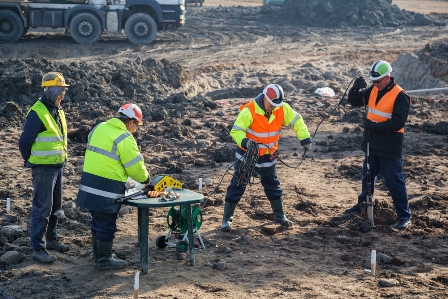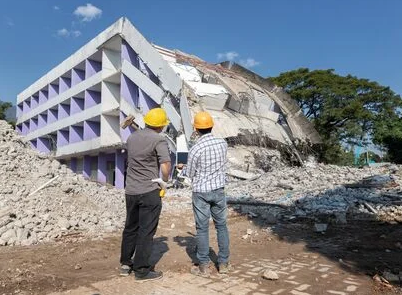
Civil Engineering
Civil Engineering is all about designing, planning, constructing and managing the formation of facilities, crucial to modern life like airports, bridges, buildings, dams, highways, transit systems, harbors, space satellites and launching facilities, offshore structures, tunnels, water supply systems, and wastewater treatment plants. Civil Engineers assume two roles, that of a Consultant and a Contractor. The Consultant works with the client to plan, design, and manage the projects, and the Contractor supervises the construction and manages the project on ground level to turn plans into realities.
Role Desciption
A Civil Engineer is required to create, design, develop, manage, and maintain small-scale and large-scale construction projects in a safe, sustainable, and a timely manner. One must conduct on-site researches and examine data through drawings, maps, reports, and tests. Carrying out scientific and expediency studies and draw blueprints that satisfy technical specifications and assessing the potential risks related to materials, and costs is their duty. They also provide advice and oversee workers and communicate with a wide variety of stakeholders and further creatively resolve emerging problems. Civil Engineers also monitor progress to compile reports for project status. They keep up with the budget for the purchase of required equipment or materials and, comply with the guidelines and regulations including; permits, safety, and deliver the necessary technical documentation as required. These professionals estimate quantities and cost of materials, equipment, or labour cost to evaluate project probability.
Eligibility
Route to Civil Engineering Profession
| Route 1 | 10 + 2 with Science Stream with Math |
| B. Tech in Civil Engineering for 4 years | |
| M. Tech for 2-3 years | |
| PhD for 2-3 years | |
| Route 2 | 10 + 2 with Science Stream with Math |
| 5 Years Dual Degree in B. Tech + M. Tech in Civil Engineering for 5 years | |
| PhD for 2-3 years |
Significant Statistics
- Majority of the colleges have eligibility criteria of minimum 50% aggregate in 10+2, while some have that of minimum 60%
- English is a must in senior secondary examination with at least 50%
- JEE score as minimum eligibility in some colleges
- Fixed age limit in some colleges/ universities
Pros/Cons
Pros
- Civil Engineers are always in demand and the packages are lucrative
- Contribute towards the community development travel opportunities to handle work at different locations
Cons
- High-pressure job
- No fixed work hours and most of the time is spent on construction site
- Work assessment by government authorities and clients may discouraging at times
Leading Professions
View All
Structural Engineering
Structural Engineers ana...
6.0LPA

Geotechnical Engineering
They are responsible for...
7.0LPA

Environmental Engineering
It is about finding solu...
4.0LPA

Materials Engineering
The science of creating ...
7.0LPA

Water Resource Engineering
It is the quantitative s...
6.0LPA

Earthquake Engineering
Designs and analyzes str...
16.0LPA

Coastal Engineering
These Engineers are resp...
10.0LPA

Transportation Engineer
Transportation engineers...
10.0LPA
CAREER VIDEOS
Career Path
Route 1
4 Steps
Skills
Recruitment Area
Government organizations ,
self employment ,
Construction Companies ,
Builders ,
Architects ,
Architecture firms ,
Railways .
Recruiters
Punj LLoyd Group ,
Jaiprakash Associates ,
Nagarjuna Construction Company ,
GMR Group ,
Hindustan Construction Company (HCC), ,
Hiranandani Construction Pvt. Ltd ,
Godrej Properties ,
Prestige Estates ,
Oberoi Realty ,
DLF Group ,
IVRCL Infrastructure and Projects Ltd ,
Larsen and Toubro ,
Nircon Engineering Consultants ,
RDS Projects Ltd ,
Macro Marvel Infrastructure Corporation Ltd .
Explore Colleges
Exams & Tests
Interested? Take the next step for this career
Route 1
- 4 Steps
Skills Needed
Exams and Tests
Recruitment Area
Government organizations ,
self employment ,
Construction Companies ,
Builders ,
Architects ,
Architecture firms ,
Railways .
Recruiters
Punj LLoyd Group ,
Jaiprakash Associates ,
Nagarjuna Construction Company ,
GMR Group ,
Hindustan Construction Company (HCC), ,
Hiranandani Construction Pvt. Ltd ,
Godrej Properties ,
Prestige Estates ,
Oberoi Realty ,
DLF Group ,
IVRCL Infrastructure and Projects Ltd ,
Larsen and Toubro ,
Nircon Engineering Consultants ,
RDS Projects Ltd ,
Macro Marvel Infrastructure Corporation Ltd .



















